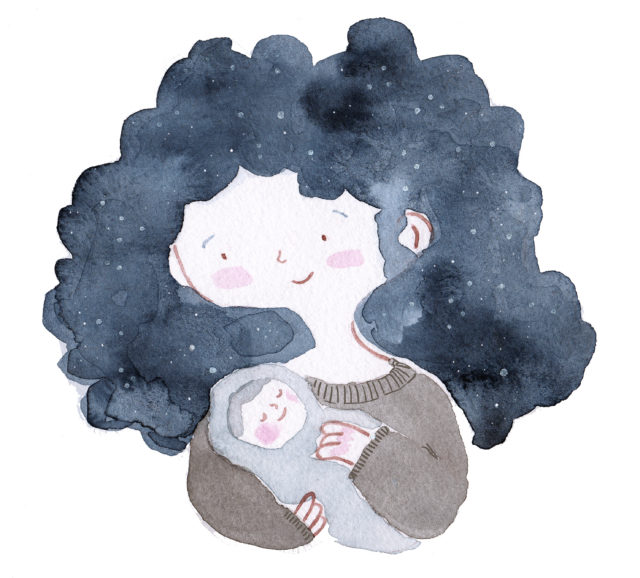It’s been a few days since the mother desert spider1 laid its babies in the breeding ground. But the babies have grown fast and are starving. Now, things are about to become weird. The mother stimulates a natural instinct in its babies that is so remarkable that biologists still find it quite fascinating. Out of nowhere, the babies become demonically aggressive and start feeding on their own mother. This is a phenomenon popularly called matriphagy2 – an extreme form of motherly sacrifice for nutritional benefits to its babies. A sacrifice for love.
This behaviour may be extreme, but animals sacrifice for their children in a variety of ways. In primates, including humans, a mother gives up several years of her life to rear her infant child. But how big of an influence can a mother have on its child’s life? Can that influence be quantifiable as well?
Dr Catherine Crockford, a primatologist at Max Planck Institute for Evolutionary Anthropology, was fascinated to dive into this topic. She wanted to understand what evolutionary advantages maternal love and care bring to the offspring, especially on primates. And when the opportunity came forth, she didn’t hesitate. This drive set her up for a five-year study focusing on a chimp troop in the Ivory Coast forest in West Africa. The conclusion of this endeavour added another chapter in understanding the evolutionary significance of emotional attachment with mothers 3.
Young chimps have a unique maternal relationship. After three and a half years of growth, a mother encourages her young to feed themselves. Despite this, mothers continue to groom and care for their child. One might think this motherly care to be casual but it turns out that this relationship is so critical that it influences how a child overcomes its challenges throughout life.
Photograph by Liran Samuni/ Tai Chimpanzee Project via Catherine Crockford on ResearchGate.
As popularised by the legendary Charles Darwin in the theory of natural selection4, traits that directly benefit a species’ survival are preferred over the long run. Motherly love prepares a young chimp to handle the hurdles of life. This loving trait may have been critical for chimps.
Crockford and her team examined the impact of motherly love in detail with a particular focus on the alpha male. The ‘alpha male’ ruling system among chimpanzees resembles an autocratic paternal system: a title the alpha has rightfully earned. He successfully strategised, fought, and gained the trust to lead. Primatologist Frans De Wall, who popularised the concept of the alpha male, explained5 that the character of an alpha male is wrongfully portrayed in human culture. The alpha has two major responsibilities: “One is to keep the peace in the groups and the other is to be an empathetic consoler in chief.”
So, what about an orphaned chimp vying for the ‘alpha’ position? Crockford said ‘it’s highly unlikely.’ Any chimp orphaned in its early childhood is at a disadvantage when competing for the alpha title compared to others that were well-fed, groomed, and protected by their mothers. It impacts their social standing and potential for mating success as well. The orphans actually end up siring fewer offspring across their lifetime compared with those whose mothers continue to live, the paper discusses. In terms of becoming a parent, orphan parents are also at a disadvantage as the average years in becoming first-time parents for orphan chimps is around 16 years – requiring an additional three years compared to non-orphaned parents.
But there are always remarkable exceptions. Males can often adopt chimps that they have not fathered, even if they have other offspring of their own. Females are preoccupied with their own young and thus can not spare the time and energy needed for orphans.
Image by Stefan Roelofs from Pixabay
Such a ‘father orphan adoption’ is not unique among chimps. It has been observed significantly in Asian macaques and Hanuman langurs as well, as stated by Mukesh Kumar Chalise, a macaque researcher based in Nepal. But, he notes that detailed studies focusing on these behaviours in old world monkeys have been lacking so far.
As humans share a close evolutionary relationship with the chimps, the current research findings may help in understanding facets of human evolution. A human child not only takes many years to become an adult but parents continue provision till adulthood. It might be “this extensive provisioning – in both apes and humans – that might have helped in brain expansion and therefore skill expansion”, says Crockford. As social beings, social communication plays a critical role. Navigation through these complex social skills requires dedicated brain growth in early life for which motherly support is immensely important.
A mother’s presence in the years between weaning and adulthood help chimp offsprings in their growth, survival, competitiveness, and ability to father offspring. But how do they do it? What exactly do mothers provide that brings these benefits? This is a question that may hover over Crockford and her team for the coming years.
The writer acknowledges Dr Catherine Crockford, Primatologist at Max-Planck Institute of Evolutionary Anthropology and Dr Mukesh K. Chalise, Ecologist and President at Nepal Biodiversity Research Society (NEBORS) for their correspondence.
This article was specialist edited by Eleanor Gourevitch and copy-edited by Dzachary Zainudden

